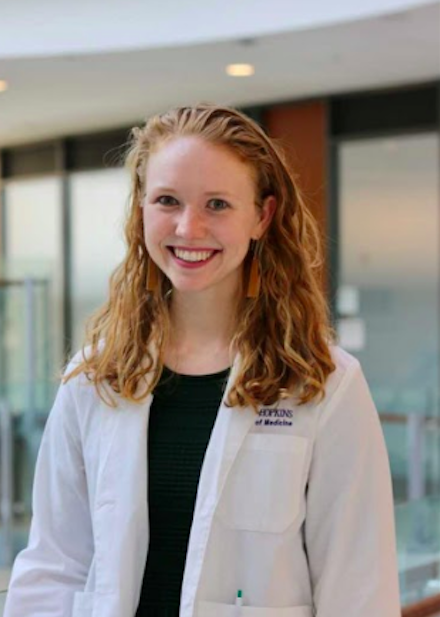Takeaway
Clinically excellent physicians sit at the same level as their patients, ask them about their fears, and are lifelong learners.

Lifelong learning in clinical excellence | January 25, 2021 | 3 min read
By Laura Pugh, Medical Student, Johns Hopkins Medicine
COVID-19 has disrupted medical students in innumerable ways, but most significantly, it deprived many of us from months of clinical education due to safety concerns. We’ll ultimately complete our rotations and graduate on time, but the lost opportunities for electives, exploration, and clinical time will be felt. In addition to building medical knowledge and skills, the wards are where we develop identities as doctors and find clinical mentors and role models.
I was grateful for the opportunity to participate in the Miller Coulson Academy Clinical Elective at Johns Hopkins, where I spent two weeks working with physicians recognized for their clinical excellence in a wide variety of specialties from emergency medicine to gerontology to oncology. During my time with each doctor, I considered what makes a physician excellent in the eyes of their peers and patients. Here are 10 takeaways from 10 excellent clinicians:
1. Never stand when you can sit.
Sitting down and facing your patient at eye level makes an enormous difference. I watched patients smile and relax when the physician pulled up a chair by their bedside to talk. Even a brief conversation at eye level feels more meaningful than a longer one from the door.
2. Silence may be awkward, but informative.
Patients are just as uncomfortable with awkward silence as you are. During interviews, long silences can feel like a waste of time, but often lead to key information.
3. Physical touch is key—even during COVID-19.
For some patients, the only contact they have during the pandemic is with healthcare professionals. Performing basic physical exams can make patients feel seen and heard—not to mention providing important clinical information. One doctor I shadowed placed her hand on the shoulder of each patient when listening to their heart and I could see the patient relax as their humanity was acknowledged through physical touch.
4. Ask about your patient’s spirit.
Patients with difficult diagnoses find ways to cope with their situation, whether we discuss it with them or not. One oncologist asked patients directly about how their spirit was and noted changes in attitude throughout the treatment course. This clearly offered an opportunity for connection as well as a bridge to conversations about life goals and goals of care.
5. Ask your patient about their fears.
During a particularly difficult conversation with a patient reluctant to get treatment, a clinician gently asked what they were afraid of. You can’t help someone work through concerns you don’t know about.
6. Know your coworkers.
A physician is only as good as their clinic environment. The most successful doctors clearly had strong relationships with their coworkers, especially with support staff.
7. Ask for help.
Every day in clinic I observed outreach and collaboration. These doctors, already clinically excellent, didn’t hesitate to reach out and work through challenging situations with colleagues. I saw physicians collaborate with colleagues at their own institution, reach out to other hospitals, and consult with anyone from other doctors to pharmacists to nursing staff.
8. End every visit summarizing key points with your patient.
Almost all of the master clinicians I worked with ended the visit with a summary and next steps. Toward the end of a visit, patients may feel disoriented or overwhelmed by the amount of information discussed. After the summary, many patients were better able to organize their thoughts in order to ask questions and seemed to feel more comfortable with ending the visit.
9. Slow and steady wins the race—even in a busy clinic.
Each of the doctors I worked with had busy clinics and full schedules. However, it was clear that their patients always felt they had their physician’s full attention during the visit. Slow approaches to interviews, moments of silence, and giving time for patients to talk improved relationships while still allowing information-gathering.
10. Be a lifelong learner.
These doctors, recognized for having achieved clinical excellence, remain curious and continuously learn new skills and knowledge from both literature and their colleagues.
Although I took this elective as a medical student, I hope to carry these lessons forward and continue to look out for role models and opportunities to continue to improve my care of all patients.
This piece expresses the views solely of the author. It does not represent the views of any organization or institution, including CLOSLER and Johns Hopkins Medicine.

